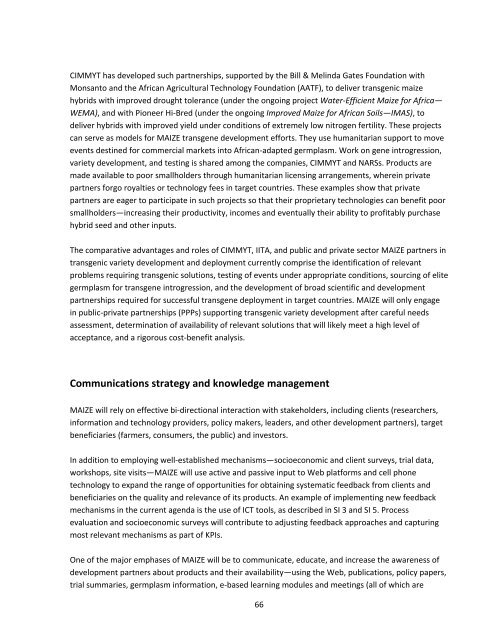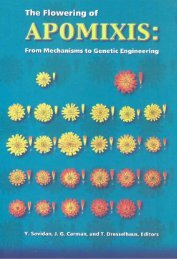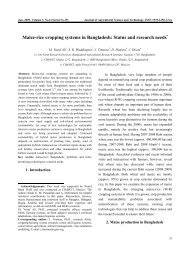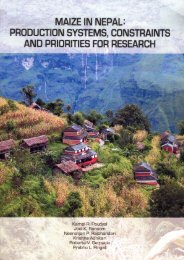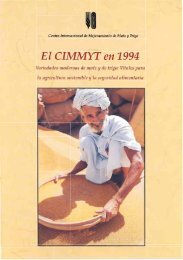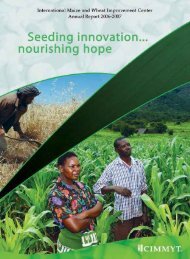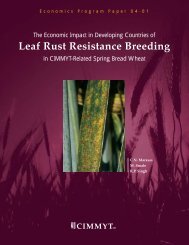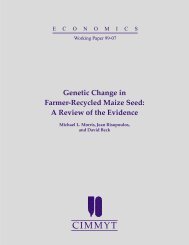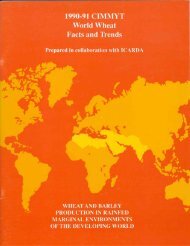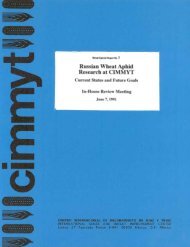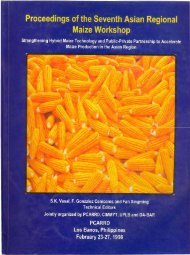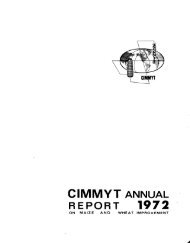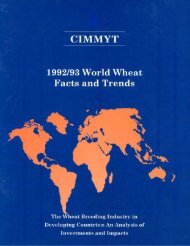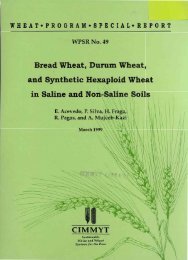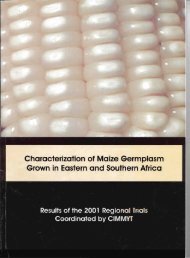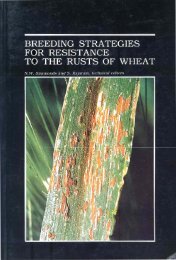Download - Maize
Download - Maize
Download - Maize
You also want an ePaper? Increase the reach of your titles
YUMPU automatically turns print PDFs into web optimized ePapers that Google loves.
CIMMYT has developed such partnerships, supported by the Bill & Melinda Gates Foundation with<br />
Monsanto and the African Agricultural Technology Foundation (AATF), to deliver transgenic maize<br />
hybrids with improved drought tolerance (under the ongoing project Water‐Efficient <strong>Maize</strong> for Africa—<br />
WEMA), and with Pioneer Hi‐Bred (under the ongoing Improved <strong>Maize</strong> for African Soils—IMAS), to<br />
deliver hybrids with improved yield under conditions of extremely low nitrogen fertility. These projects<br />
can serve as models for MAIZE transgene development efforts. They use humanitarian support to move<br />
events destined for commercial markets into African‐adapted germplasm. Work on gene introgression,<br />
variety development, and testing is shared among the companies, CIMMYT and NARSs. Products are<br />
made available to poor smallholders through humanitarian licensing arrangements, wherein private<br />
partners forgo royalties or technology fees in target countries. These examples show that private<br />
partners are eager to participate in such projects so that their proprietary technologies can benefit poor<br />
smallholders—increasing their productivity, incomes and eventually their ability to profitably purchase<br />
hybrid seed and other inputs.<br />
The comparative advantages and roles of CIMMYT, IITA, and public and private sector MAIZE partners in<br />
transgenic variety development and deployment currently comprise the identification of relevant<br />
problems requiring transgenic solutions, testing of events under appropriate conditions, sourcing of elite<br />
germplasm for transgene introgression, and the development of broad scientific and development<br />
partnerships required for successful transgene deployment in target countries. MAIZE will only engage<br />
in public‐private partnerships (PPPs) supporting transgenic variety development after careful needs<br />
assessment, determination of availability of relevant solutions that will likely meet a high level of<br />
acceptance, and a rigorous cost‐benefit analysis.<br />
Communications strategy and knowledge management<br />
MAIZE will rely on effective bi‐directional interaction with stakeholders, including clients (researchers,<br />
information and technology providers, policy makers, leaders, and other development partners), target<br />
beneficiaries (farmers, consumers, the public) and investors.<br />
In addition to employing well‐established mechanisms—socioeconomic and client surveys, trial data,<br />
workshops, site visits—MAIZE will use active and passive input to Web platforms and cell phone<br />
technology to expand the range of opportunities for obtaining systematic feedback from clients and<br />
beneficiaries on the quality and relevance of its products. An example of implementing new feedback<br />
mechanisms in the current agenda is the use of ICT tools, as described in SI 3 and SI 5. Process<br />
evaluation and socioeconomic surveys will contribute to adjusting feedback approaches and capturing<br />
most relevant mechanisms as part of KPIs.<br />
One of the major emphases of MAIZE will be to communicate, educate, and increase the awareness of<br />
development partners about products and their availability—using the Web, publications, policy papers,<br />
trial summaries, germplasm information, e‐based learning modules and meetings (all of which are<br />
66


